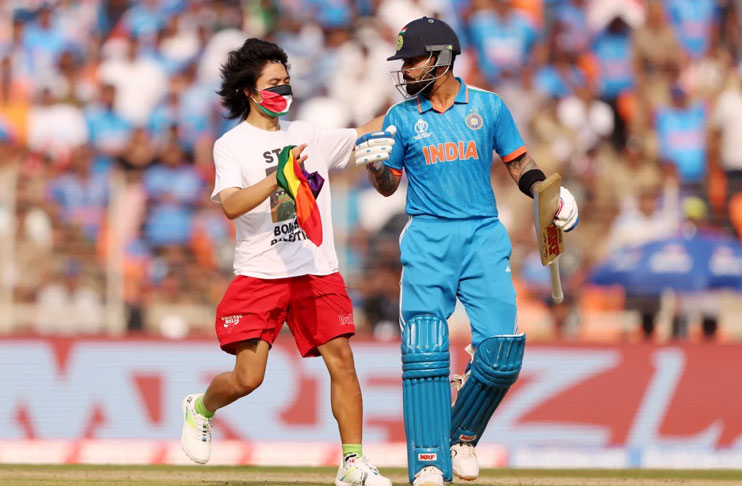In a powerful turn of events during the highly anticipated final match between Australia and India, a player made a bold statement in solidarity with Palestine, elevating the issue of ongoing conflicts to the forefront of the global stage. The incident unfolded at the Indian home ground, captivating over 100,000 spectators present and millions tuned in to watch the match on television.

The Unprecedented Protest
As the final match between cricket powerhouses Australia and India reached a critical juncture, a powerful protest unfolded that transcended the boundaries of sports. A lone individual, often labeled a “madman,” entered the stadium adorned in a Palestinian mask and a shirt bearing the clear message: “Stop Bombing Palestine.” Undeterred, he traversed to the pitch, temporarily halting the match.
Global Attention on the Field
The incident drew the attention of the entire world as the powerful protest by the player unfolded on the grand stage of the cricket final. With millions witnessing the disruption on live television and over 100,000 spectators in the stadium, the message resonated far beyond the confines of the cricket field.
Momentary Pause in Play
The intruder’s presence on the pitch prompted a temporary suspension of the match, emphasizing the gravity of the situation. This unexpected disruption became a symbol of the urgency and significance of addressing global issues, even within the realm of sports.
A Bold Advocate for Palestine
Despite being labeled by some as a “madman,” the individual emerged as a courageous advocate for Palestine. The deliberate choice of a Palestinian mask and a shirt condemning the bombing of Palestine conveyed a powerful message of solidarity and protest against ongoing conflicts.
Global Witness to a Defining Moment
Broadcasted to millions worldwide, the incident became a defining moment that transcended the boundaries of sportsmanship. The protest underscored global interconnectedness and showcased the ability of sports events to serve as platforms for raising awareness about pressing global issues.

A Call for Reflection and Dialogue
In the aftermath of the disruption, the incident prompts reflection on the intersection of sports and politics. It raises questions about the role of athletes and spectators in amplifying crucial causes and emphasizes the responsibility of global institutions to address humanitarian concerns.
May Allah Protect This Young Man
The concluding sentiment, “May Allah protect this young man,” reflects the deep emotions stirred by the protest. It underscores the risks taken by individuals using their platforms to draw attention to critical issues and expresses hope for their safety and well-being.
Conclusion: Beyond the Boundaries of the Game
The incident during the Australia-India final serves as a powerful reminder that sports events, beyond their entertainment value, have the potential to amplify voices and shed light on global injustices. As the cricketing world grapples with the aftermath of this unprecedented protest, it prompts a broader conversation about the role of athletes, spectators, and institutions in fostering positive change on a global scale. In a world where actions often speak louder than words, this unexpected interruption during a cricket final becomes a chapter in the ongoing narrative of individuals using their influence to advocate for justice and equality, even on the hallowed grounds of a sports stadium.
FAQs (Frequently Asked Questions)
Who was the individual involved in the protest during the Australia-India final, and what message did they convey?
The individual, described by some as a “madman,” entered the stadium wearing a Palestinian mask and a shirt with the message “Stop Bombing Palestine.” The protest aimed to raise awareness and advocate for an end to the bombing in Palestine.
How did the protest impact the Australia-India final, and what was the response?
The protest caused a temporary halt in the match as the individual reached the pitch. The disruption brought attention to the global stage, prompting reflection on the intersection of sports and politics.
What was the global reaction to the protest, considering millions were watching live, and over 100,000 spectators were present in the stadium?
The incident garnered global attention, with millions witnessing the disruption on live television and a significant number of spectators present in the stadium. It became a defining moment that transcended the boundaries of sports, emphasizing the ability of sports events to raise awareness about pressing global issues.
What are the broader implications of this incident for the intersection of sports and politics?
The incident prompts reflection on the role of athletes and spectators in amplifying important causes and raises questions about the responsibility of global institutions to address humanitarian concerns. It sparks a conversation about the potential for sports events to serve as platforms for social and political advocacy.
Was there any official response from the cricketing authorities or governing bodies regarding the protest?
The blog does not provide information about any official response from cricketing authorities or governing bodies. Additional news or statements from relevant authorities may provide more insights into their stance on the incident.
What is the concluding sentiment, “May Allah protect this young man,” and why is it included in the blog?
The concluding sentiment expresses a hope for the safety and well-being of the individual who staged the protest. It reflects the deep emotions stirred by the incident and acknowledges the risks taken by individuals using their platforms to draw attention to critical global issues.
What impact could this protest have on the ongoing conversation about justice and equality on a global scale?
The protest during the Australia-India final becomes a chapter in the ongoing narrative of individuals using their influence to advocate for justice and equality. It prompts a broader conversation about the role of sports in fostering positive change and the impact of such actions on the global stage.

